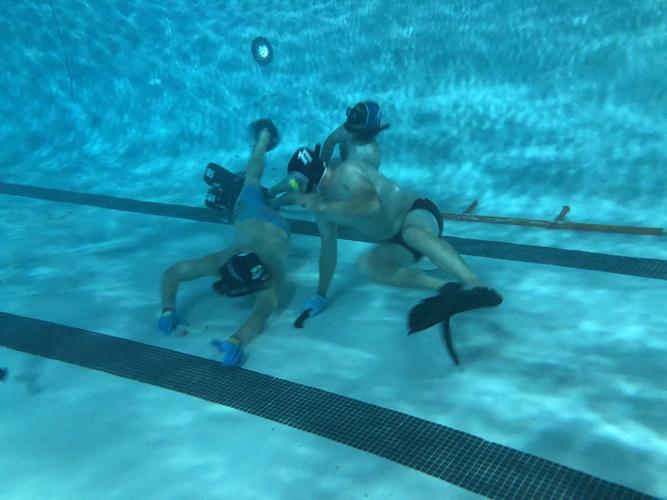I recently participated in a practice session — actually about half of a session — of a sport at Orange Coast College called octopush, a form of hockey played underwater. Players hold their breath and push a puck from one side of the pool to the other by coordinating with teammates and trying to score.
Teams consist of six players with three on offense and three on defense. Both teams have their own color sticks, either black or white, so they can tell each other apart. The objective is to work as a team to score goals on either side of the pool.
I’ll admit, there was something about choosing to play underwater hockey that seemed funny to me. I thought of it as unorthodox for people looking to pass time.
It was only shortly after showing up and talking with the instructor Casey Nakamura that I learned octopush is no laughing matter. It is taken seriously on an international level and Nakamura was planning on trying out to represent Team USA’s octopush team for a competition in Australia.
Nakamura said octopush is actually very competitive.
“There was a 20 team tournament just recently in Los Angeles where players from all over the west coast came. A team from China and multiple teams from Canada also participated,” he said.
Octopush started in the United Kingdom in the 1950s as a way for divers to stay in shape and increase their dive skills during the winter. Since then it has expanded as a sport played in over 30 countries.
“Gear has improved from the 50s, with sticks originally being made of wood and the puck being made of brass. Sticks are now made of carbon fiber and pucks are made for sliding in the pool,” Nakamura said.
The OCC Octopush Club is the only one between Los Angeles and San Diego. Nakamura is the club’s founder.
“I moved over here for work and I knew there was a club in Los Angeles and a club in San Diego but there was no team in between. So I worked with (OCC’s) Community Education department to make it a community education class. Anyone can come and participate whenever they want, all they need is a swim suit and themselves. I have everything else,” he said.
I originally showed up to the pool just to conduct a few interviews. But after my interview with Nakamura, he convinced me to jump in the water to join him and his team for a friendly scrimmage.
Once I heard that this is an extremely competitive and serious sport, my competitive side made me want to try it out. Nakamura gave me the proper gear: a mask, fins, snorkel, hockey stick and protective gloves. Shortly thereafter, I found myself in a pool exhausted, out of breath and having no idea what was going on.
Michael Habitz, a non-student player on the team tried to settle my nerves.
“It seems intimidating at first, but as you get used to it you start to be able to predict what’s going to happen and when you should get involved,” he said while trying to coach me.
And he was right. I was out of breath. I didn’t know where my teammate was. I struggled to get under the surface and help. I wasn’t as fast as the other players. This wasn’t a sport — it was the “Hunger Games.”
I had been teamed up with Nakamura and we were taking on three opponents in a two-versus-three competition. I found myself more often than not floating above water trying to catch my breath while I watched Nakamura weave underwater like he had turned into an underwater creature, never coming up for air and effortlessly scoring without any of my help.
Meanwhile I looked like a dead fish that had surfaced to the water and couldn’t go back down if I tried. An hour and a half had passed and all oxygen had left my brain. My legs turned to Jell-O. My drive to continue on was completely gone. I had been emasculated. There goes thinking octopush is a laughing matter.
After finishing half of the team’s normal practice, I tapped out and realized that this was one of the most intensive training sports you could play. It forces you to hold your breath while exerting a tremendous amount of energy trying to swim faster and be more aggressive than anyone else while refining your skills with the hockey stick and puck to score and pass while underwater.
This sport is not for the unathletic looking to enjoy a fun pastime. This is for the Navy Seals in training looking to be able to do tremendous things under water while never touching the surface. It is truly for only a few and should never be taken lightly.
If you think you have what it takes to tough this sport out, Nakamura and his group meet at the Aquatic Center pool every Wednesday from 7 p.m. until 9 pm. They also go for dinner after every practice. In addition to having a nice community to be a part of, you’ll strengthen your lungs and body in ways you never thought possible.






(0) comments
Welcome to the discussion.
Log In
Keep it Clean. Please avoid obscene, vulgar, lewd, racist or sexually-oriented language.
PLEASE TURN OFF YOUR CAPS LOCK.
Don't Threaten. Threats of harming another person will not be tolerated.
Be Truthful. Don't knowingly lie about anyone or anything.
Be Nice. No racism, sexism or any sort of -ism that is degrading to another person.
Be Proactive. Use the 'Report' link on each comment to let us know of abusive posts.
Share with Us. We'd love to hear eyewitness accounts, the history behind an article.